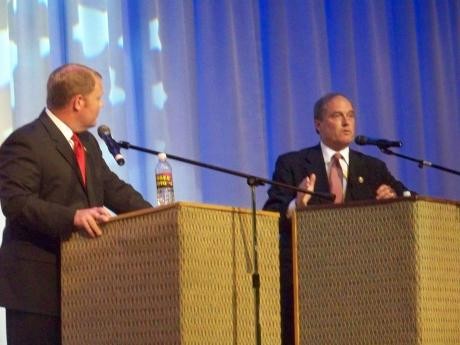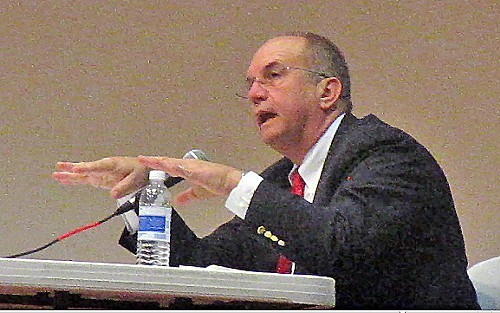Judge Samuel H. Mays was not fooled by the preposterous. Instead, he let the obvious, in the form of a damning videotape that was played in his courtroom in September, speak for itself. And a state law that was clearly aimed at Shelby County to allow suburbs to form their own school systems was found unconstitutional.
“The legislative history of Public Chapter 905, taken as a whole and fairly considered, firmly establishes that Chapter 905 was designed to apply only to Shelby County,” Mays wrote. “That design is not dispositive, but it supports the conclusion, derived from an examination of potentially comparable counties, that Chapter 905 applies to a particular county.
“One example among many occurred on April 27, 2012. When discussing House Bill 1105 (“HB 1105”), which became Chapter 905, two legislators explained why the bill that came from the Conference Committee differed from the bill in its original form:
Rep. Hardaway: [T]his is different from the original Bill in that it only, this is different from the original Bill in that it only pertains to Shelby County?
Rep. Montgomery: That is what it does. What they did here is by stating what I read there, if a municipality is located within a county in which a transition planning commission has been developed, and that is the only county in the State of Tennessee that has that, so it limits it to Shelby. You are right.”
Mays wrote that “This and similar exchanges reinforce Chapter 905‟s limited application to Shelby County.”
Before reaching the conclusion of his 65-page ruling, Mays established the “ripeness” of the issue.
“The contingencies of August 8, 2011, have become reality. Chapter 905 provides the procedural mechanism for creating municipal school districts . . . Withholding a determination until a later date would cause uncertainty about the validity of municipal school systems that would create a hardship to the Commissioners and to the Municipalities.”
Mays spent several pages of his ruling dealing with the contention that the state law could possibly apply to other small counties in West Tennessee, notably Gibson County, which was the subject of two days of tedious courtroom hearings this summer. He concluded that plain words mean what they say.
He wrote: “In other words, courts must “interpret constitutional provisions in a principled way that attributes plain and ordinary meaning to their words and that takes into account the history, structure, and underlying values of the entire document.”
He relied on Black’s Law Dictionary and the Oxford English Dictionary to make his points.
“Reasonable” is a common legal term that means “[f]air [or] proper . . . under the circumstances.” Black‟s Law Dictionary 1272 (Bryan A. Garner ed. 7th ed. 1999). “Rational” is defined as “[h]aving sound judgment; sensible.” XIII Oxford English Dictionary, at 291. “Pragmatic” means “practical; dealing with a practice; matter-of-fact.” XII Oxford English Dictionary, at 278. Together, these terms require courts to apply fair, sensible, and matter-of-fact readings to statutes.”
“Theoretical, illusory, or merely possible considerations are distinguishable. See Farris, Theoretical is defined as “existing only in theory, ideal, or hypothetical.” XVII Oxford English Dictionary, at 901. “Illusory” means having “the quality of . . . tending to deceive by unreal prospects.” VII Oxford English Dictionary, at 662. “Possible” refers to that “which may come about or take place without prevention by serious obstacles.” XII Oxford English Dictionary, at 175. Together, these terms suggest that courts must refrain from statutory interpretations that are hypothetical, unreal, or face serious obstacles.”
And finally, Mays wrote: “Applying reasonable, rational, and pragmatic rules, Chapter 905 does not and will not apply to Gibson County.”
A former chief of aide to former Tennessee governor Don Sundquist, Mays was not fooled by the elaborate burlesque of the municipalities and their lawyers.
“There is in the history a sense of a wink and a nod, a candid discussion of the bill‟s purpose occasionally blurred by a third-party correction. The history is clear, however, that the bill never would have passed had it not been intended to apply only to Shelby County.
“Only Shelby County has undertaken the process set forth in Chapter 1. Chapter 905 establishes a series of conditions that have no reasonable application, present or potential, to any other county.
“Although general in form, Public Chapter 905 is local in effect. Because it does not include a provision for local approval, Chapter 905 is VOID under Article 11, Section 9 of the Tennessee Constitution. All actions taken under the authority of Chapter 905 are VOID. The Municipalities are enjoined from proceeding under Chapter 905 to establish municipal school districts.”
Related story: A Judicial Joke


